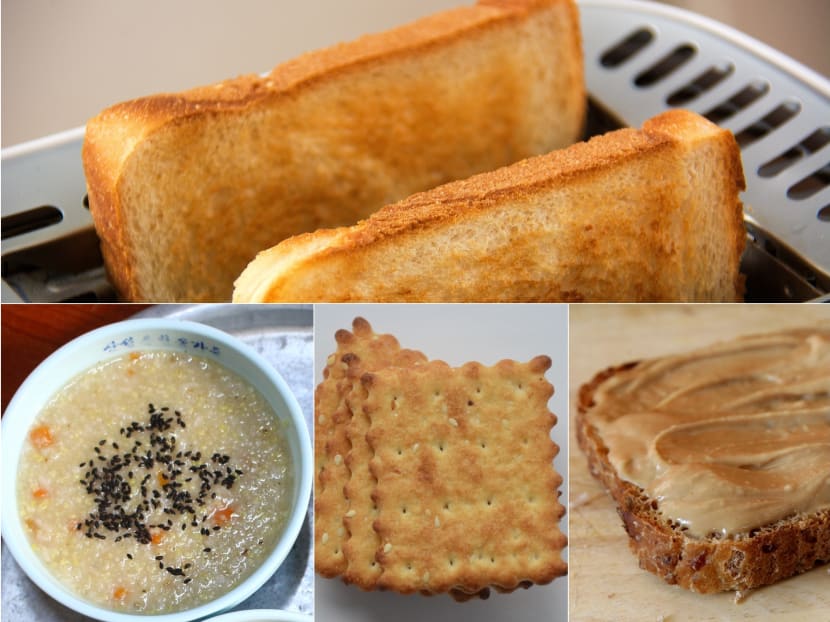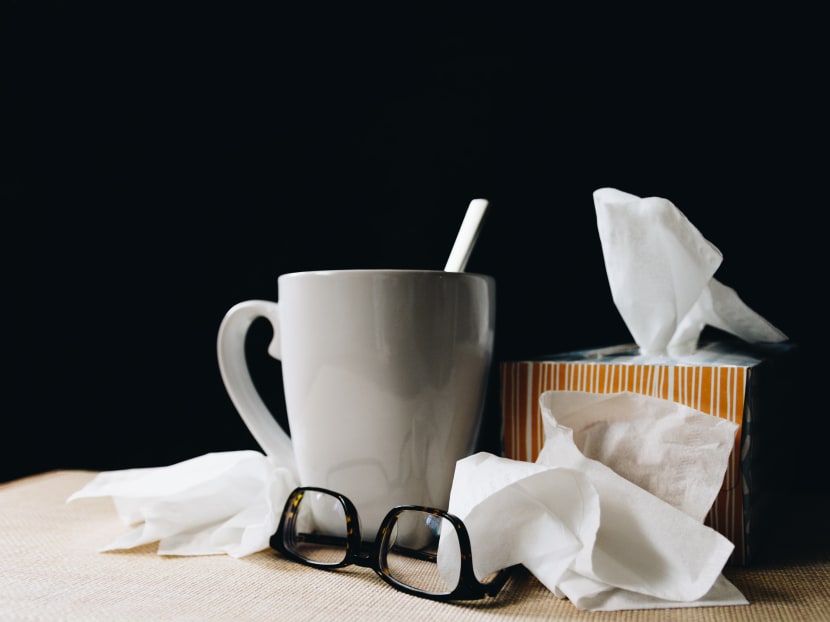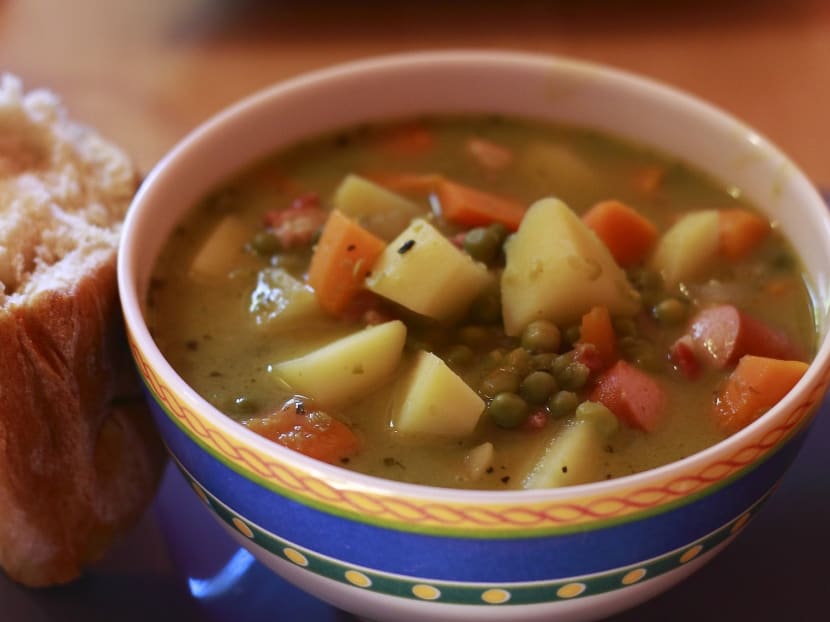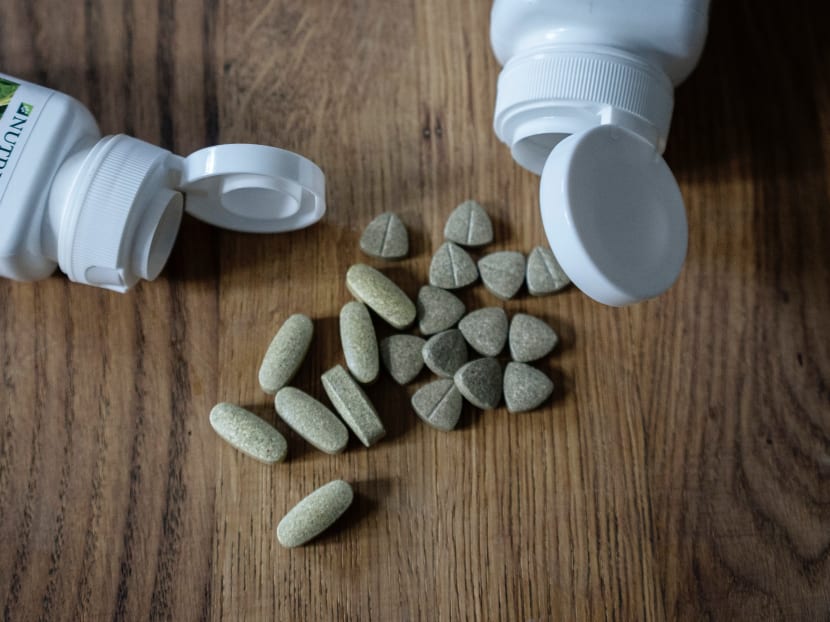Down with Covid-19 or flu? When you don't feel well, good nutrition is more important than ever
SINGAPORE — It is not unusual for people to lose their appetite and eat less when they are sick. And with an altered perception of taste and smell being one of the common symptoms of Covid-19, food intake can take an even bigger nosedive. However, eating and drinking well is even more important when one is nursing a sickness.

The body requires energy, protein, vitamins and minerals to support recovery from an infection, a dietitian said.
- Eating well is essential when recovering from infections such as Covid-19
- Symptoms such as a loss of appetite and of the sense of taste and smell can make it harder for patients to eat and drink well
- Experts gave tips on how to overcome poor appetite and smell and taste abnormalities
- They also talked about what the body needs and what to stock at home to prepare nutritious meals when recovering at home
SINGAPORE — It is not unusual for people to lose their appetite and eat less when they are sick. And with an altered perception of taste and smell being one of the common symptoms of Covid-19, food intake can take an even bigger nosedive.
However, eating and drinking well is even more important when one is nursing a sickness.
Dietitian Ang Ming Hui with the department of dietetics at the National University Hospital (NUH) said that the body needs more energy and fluid when it is fighting off an infection.
“Prolonged insufficient energy and protein intake can lead to muscle loss, aggravating fatigue and hindering recovery.
“It is important for people to continue to eat and drink even when they might not feel hungry or thirsty, to obtain enough nutrition to support immune systems and protect against muscle loss,” Ms Ang said.
With the majority of people diagnosed with Covid-19 having to recover at home as a default here, experts explain why eating right matters, how to overcome poor appetite and a loss of smell and taste, and the essential nutrients to support the recovery process.
WHY THERE IS A LOSS OF APPETITE
Dr Jonathan Chong, resident doctor at DTAP Clinic said that people who have Covid-19 may experience a variety of symptoms. One of these is that their sense of taste and smell may be reduced or be temporarily lost.
Based on a review of 10 studies, it is estimated that 52 per cent of Covid-19 patients report smell abnormalities and 44 per cent report taste abnormalities.
Dr Chong explained: “Our perception of taste is closely linked to our sense of smell. As such, when someone has a diminished or completely absent sense of smell due to Covid-19, the lack of taste may affect their appetite because food is perceived to be blander than usual.”
Covid-19 may also directly alter the taste perception. For some people, food may taste “metallic” or even bitter, he added.
“Moreover, when a person is unwell, they may feel generally more fatigued and have poor appetite as their body is fighting against a viral infection.
“This is a common symptom for many viral infections, not just Covid-19.”
HOW TO DEAL WITH WEIGHT LOSS, CHANGES IN SENSES
Ms Ang from NUH said that patients may notice some weight loss when they are unable to meet their increased nutritional requirements during an infection.
“To prevent further weight loss, rebuild strength and maintain the immune system, they should try to have small frequent meals.”
Dr Chong said that for most people, symptoms of smell and taste abnormalities are not permanent and they will resolve over the course of several weeks without the need for treatment or intervention.
He noted that a survey of Covid-19 patients in Italy found that more than four in five (83 per cent) of them reported complete recovery of taste and smell at an average of 37 days after their symptoms first appeared.
For those struggling with taste or smell changes, Ms Ang suggested starting with foods that are bland, especially if they also feel nauseated.
For example, dry food such as crackers or toast might be easier on the stomach. And in Asian countries, eating porridge may be the more common choice since it is easier to digest.

To make dishes more appealing, consider adding herbs and spices such as pepper, five-spice powder, cinnamon, curry powder, garlic, parsley, coriander and rosemary, she said.
“Be experimental,” Ms Ang added.
“One can try out food with different food textures, flavours and temperatures to find out new preferences in food when there is a change in the palate.
“For those struggling with a dry mouth, try sucking on sour candies, ice popsicles or sliced citrus fruits to stimulate saliva production.”
Ms Ang said that citrus fruits are “not contraindicated during diarrhoea”, which means that they are not harmful to a person who has diarrhoea.
WHY STAYING HYDRATED MATTERS
Dr Chong said that Covid-19 can also cause patients to lose more fluids than usual, through the skin or respiratory tract.
Coupled with gastrointestinal symptoms such as nausea, vomiting and diarrhoea, fluid loss may be exacerbated and further hinder recovery time if it is not replenished properly.
“Dehydration can lead to lower blood pressure, electrolyte abnormalities and symptoms such as dizziness and lethargy,” he said.

To prevent dehydration during an infection, Ms Ang advised drinking plenty of water or other fluids such as barley water, coconut water, soy milk, lemon-infused water, soup and milk.
If there are gastrointestinal symptoms, milk or other products containing lactose should be avoided temporarily.
An oral hydration solution that contains a combination of minerals is also a good way to restore fluid loss, and can be easily bought from pharmacies, she added.
Dr Chong said that for patients who are unable to eat or drink sufficiently during the course of an infection, they may require more support such as intravenous fluids.
WHAT TO EAT TO SUPPORT RECOVERY
Ms Ang the dietician said that the body requires energy, protein, vitamins and minerals to support recovery from an infection. For a balanced meal, she suggested referring to the “My Healthy Plate” concept where:
- A quarter of the plate should be filled with carbohydrate-rich food such as rice, bread and noodles, which are a good source of energy
- Another quarter should be filled with protein food such as meat, fish, tofu or egg to help prevent muscle loss and maintain the immune system
- Fruit and vegetables should take up half of the plate. They provide important minerals and vitamins to support the immune system and for recovery from Covid-19
It does not take much to whip up a nutritious meal fast with minimal effort. Ms Ang suggested having these handy ingredients at home:
- Frozen fish, prawns, vegetables, mushrooms. Most are pre-washed and pre-cut, which means minimal preparation is needed before cooking. They can be added into noodles, pasta or as a side with rice, turned into a one-tray oven-baked meal or steamed over a stove
- Canned tuna can be used to make sandwiches, eaten with a wrap or added into pasta
- Store-bought low-salt broth can be cooked with staples such as kway teow, noodles, udon or macaroni, followed by tofu, meat, frozen prawns or fish as desired. Stir in some vegetables for a balanced meal
- Peanut butter can be eaten with toast or crackers, or made into a peanut butter banana milkshake
- Nuts, seeds, soy pudding, yoghurt, soy milk or milk are convenient and nourishing snacks to keep at home
- Chicken or minced meat porridge makes an easy one-pot meal, but do stir in some boiled green vegetables
- A balanced, one-pot soup dish can be made using chicken, carrots, potatoes, cabbage and celery

DO VITAMIN SUPPLEMENTS HELP?
Ms Ang said that some vitamins and minerals, such as vitamins C and D, and zinc, are known to be important for the immune system to function normally.
For example, she pointed out that the immune system can be compromised in those who have vitamin D or zinc deficiency, which can be confirmed with blood tests.
“Vitamin D deficiency can be common particularly in people who stay indoors most of the time and with diet lacking vitamin D-rich food. It is found in oily fish such as salmon or sardine, egg and fortified dairy products.”
That said, the jury is still out on whether supplementing with certain vitamins is particularly helpful when one is down with Covid-19.
Ms Ang said that a review published early this year analysed the link between vitamin D supplementation and prevention of acute respiratory infections.
It showed that vitamin D supplementation of 400 to 1000 international units (IU) was generally safe and shown to have protective effect — though small — against acute respiratory infections.
However, it remains unclear if these results are applicable to Covid-19 patients, she added.

There are also ongoing studies conducted on vitamin C supplementation in Covid-19 patients.
“It is believed that human bodies are under stress during infections and vitamin C, as one of the antioxidants with anti-inflammatory property, could potentially be helpful.
“However, none of the research has shown convincing evidence to either support or be against the use of vitamin C supplementation during Covid-19,” Ms Ang said.
At the moment, there is also not enough evidence and data on the recommended amount of vitamin C for people recovering from Covid-19 or to prevent the infection, she added.
For the body’s day-to-day needs, though, it is still crucial to ensure that one obtains adequate vitamin C.
The recommended daily amount for women is 85mg of vitamin C and 8mg of zinc, and 105mg of vitamin C and 11mg of zinc for men, she said.
Vitamin C-rich foods include citrus fruits such as oranges, guava, strawberries, broccoli and bell peppers.
“Those who struggle with food intake because of loss of appetite or fatigue can consider taking multivitamins that meet but do not exceed recommended dietary allowance.
“It is always prudent to consult a doctor before starting any supplements because overdosing can lead to potential side effects,” Ms Ang cautioned.
Ms Simone Tan, a pharmacist by training and general manager of HST Medical, a Singapore-based health and wellness company, said that people may also consider nutritionally complete beverage supplements to meet their calorie requirements during recovery from an infection.
These are available at pharmacies and supermarkets, which carry certain brands of such beverage supplements.
For those considering vitamin supplementation, it is advisable to follow the recommended dosages on the product packaging, Ms Tan said.






